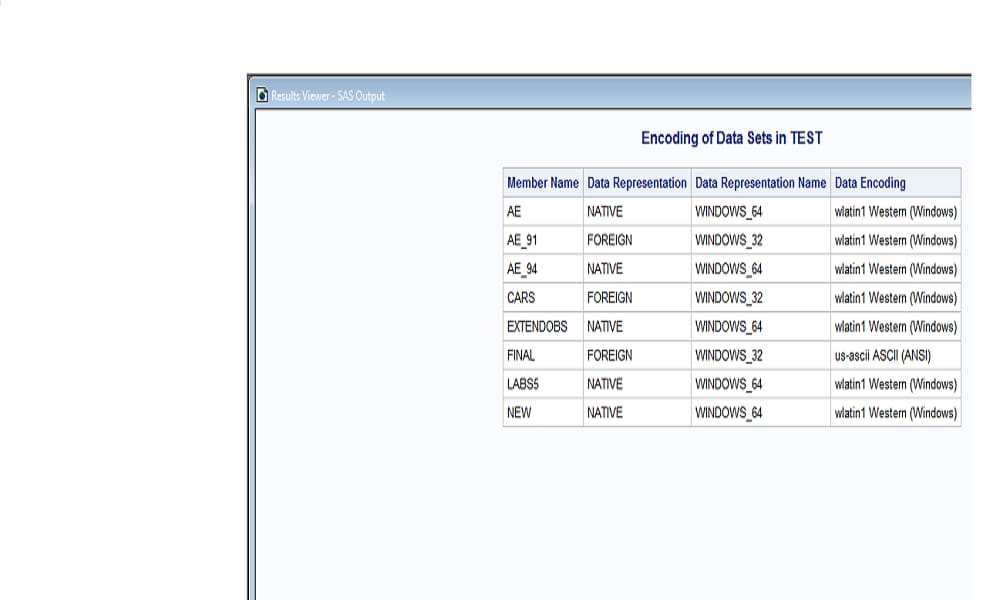Sample 55054: PROC SQL can be used to identify data representation and encoding for all data sets in a library
 |  |  |  |  |
SAS® data files that match your session encoding are considered to be native, whereas data files that are encoded differently are considered to be foreign. Cross-Environment Data Access (CEDA) is an underlying SAS technology that surfaces foreign data sets to your current SAS session. CEDA has some limitations that are explained here.
Should the processing capabilities of CEDA be insufficient for your use, consider copying the foreign data sources into a native data representation or encoding.
The sample code on the Full Code tab illustrates how the SQL procedure can be used to identify data representation and encoding for all data sets in a library.
These sample files and code examples are provided by SAS Institute Inc. "as is" without warranty of any kind, either express or implied, including but not limited to the implied warranties of merchantability and fitness for a particular purpose. Recipients acknowledge and agree that SAS Institute shall not be liable for any damages whatsoever arising out of their use of this material. In addition, SAS Institute will provide no support for the materials contained herein.
If you want to identify which data sets in your SAS session will trigger the Cross-Environment Data Access (CEDA) notes or warnings, try the sample code below. This was extracted from the blog "Finding the FOREIGNers in your SAS environment".
/* To run this code, use a valid path to a library of mixed data representations and/or encodings */
libname test 'c:\'; /*<---add a valid path */
%let Library = TEST ;
proc sql;
title "Encoding of Data Sets in &Library";
select memname, datarep, datarepname, encoding
from sashelp.vtable where
libname="&Library"
and memtype = 'DATA';
quit;
title;
These sample files and code examples are provided by SAS Institute Inc. "as is" without warranty of any kind, either express or implied, including but not limited to the implied warranties of merchantability and fitness for a particular purpose. Recipients acknowledge and agree that SAS Institute shall not be liable for any damages whatsoever arising out of their use of this material. In addition, SAS Institute will provide no support for the materials contained herein.
If you want to identify which data sets in your SAS® session will trigger the Cross Environment Data Access (CEDA) notes or warnings, this sample code should help.
| Type: | Sample |
| Topic: | Common Programming Tasks ==> Reading and Writing External Data ==> Multiple Files Common Programming Tasks ==> Reading and Writing External Data Common Programming Tasks Data Management ==> Administration ==> Migration Data Management ==> Administration Data Management ==> Data Sources ==> CEDA (Cross-environment Data Access) |
| Date Modified: | 2015-02-04 16:02:15 |
| Date Created: | 2015-01-22 13:25:34 |
Operating System and Release Information
| Product Family | Product | Host | SAS Release | |
| Starting | Ending | |||
| SAS System | Base SAS | HP-UX | 8.2 TS2M0 | |
| AIX | 8.2 TS2M0 | |||
| ABI+ for Intel Architecture | 8.2 TS2M0 | |||
| 64-bit Enabled Solaris | 8.2 TS2M0 | |||
| 64-bit Enabled HP-UX | 8.2 TS2M0 | |||
| 64-bit Enabled AIX | 8.2 TS2M0 | |||
| Windows Millennium Edition (Me) | 8.2 TS2M0 | |||
| Microsoft Windows XP Professional | 8.2 TS2M0 | |||
| Microsoft Windows Server 2003 Standard Edition | 8.2 TS2M0 | |||
| Microsoft Windows Server 2003 Enterprise Edition | 8.2 TS2M0 | |||
| Microsoft Windows Server 2003 Datacenter Edition | 8.2 TS2M0 | |||
| Microsoft Windows NT Workstation | 8.2 TS2M0 | |||
| Microsoft Windows 2000 Professional | 8.2 TS2M0 | |||
| Microsoft Windows 2000 Server | 8.2 TS2M0 | |||
| Microsoft Windows 2000 Datacenter Server | 8.2 TS2M0 | |||
| Microsoft Windows 2000 Advanced Server | 8.2 TS2M0 | |||
| Microsoft Windows 95/98 | 8.2 TS2M0 | |||
| OS/2 | 8.2 TS2M0 | |||
| OpenVMS VAX | 8.2 TS2M0 | |||
| z/OS | 8.2 TS2M0 | |||
| IRIX | 8.2 TS2M0 | |||
| Linux | 8.2 TS2M0 | |||
| OpenVMS Alpha | 8.2 TS2M0 | |||
| Solaris | 8.2 TS2M0 | |||
| Tru64 UNIX | 8.2 TS2M0 | |||
